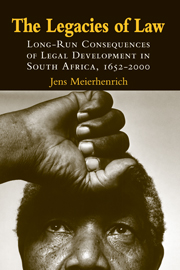Book contents
- Frontmatter
- Contents
- List of Figures
- List of Tables
- List of Cases
- Preface and Acknowledgments
- The Legacies of Law
- 1 Introduction
- PART I A THEORY OF LAW
- PART II A HISTORY OF LAW
- 4 Apartheid and the Law I
- 5 Apartheid and the Law II
- 6 Apartheid's Endgame and the Law I
- 7 Apartheid's Endgame and the Law II
- PART III A COMPARATIVE ANALYSIS
- 9 Conclusion
- Bibliography
- Index
6 - Apartheid's Endgame and the Law I
Published online by Cambridge University Press: 18 December 2009
- Frontmatter
- Contents
- List of Figures
- List of Tables
- List of Cases
- Preface and Acknowledgments
- The Legacies of Law
- 1 Introduction
- PART I A THEORY OF LAW
- PART II A HISTORY OF LAW
- 4 Apartheid and the Law I
- 5 Apartheid and the Law II
- 6 Apartheid's Endgame and the Law I
- 7 Apartheid's Endgame and the Law II
- PART III A COMPARATIVE ANALYSIS
- 9 Conclusion
- Bibliography
- Index
Summary
This chapter shows that the apartheid state was, in an important respect, necessary for making democracy work. The analysis finds a path-dependent relationship between law and politics. I explain why the dual state from the past, as explicated in Chapters 4 and 5, was a usable state in the present of apartheid's endgame. I show how the ultimate logic of apartheid's endgame was structured by this state. The state mattered both as an idea and an institutional structure. The apartheid state – qua law – provided the possibility of, and potential for, the kind of action that could move interacting adversaries away from confrontation, toward cooperation. From the perspective of the longue durée, the dual state served apartheid, but it served democracy as well. In what follows, I focus on legal norms and institutions. As we shall see, as specific legacies of liberalism, these legal norms and institutions facilitated – in crucial and unexpected ways – the resolution of apartheid's endgame.
FROM CRISIS TO ENDGAME
Before the endgame there was crisis. Apartheid's government under P. W. Botha experienced a number of serious shocks to the country's racial edifice that together pushed the regime toward exhaustion. Three shocks in particular contributed to apartheid's crisis: (1) the collapse of the Portuguese empire in southern Africa; (2) the economic downturn and the u-turn in investment; and (3) the mounting resistance and insurrection in the country's townships. Interaction effects among these shocks plunged the apartheid regime into disarray.
- Type
- Chapter
- Information
- The Legacies of LawLong-Run Consequences of Legal Development in South Africa, 1652–2000, pp. 175 - 218Publisher: Cambridge University PressPrint publication year: 2008



